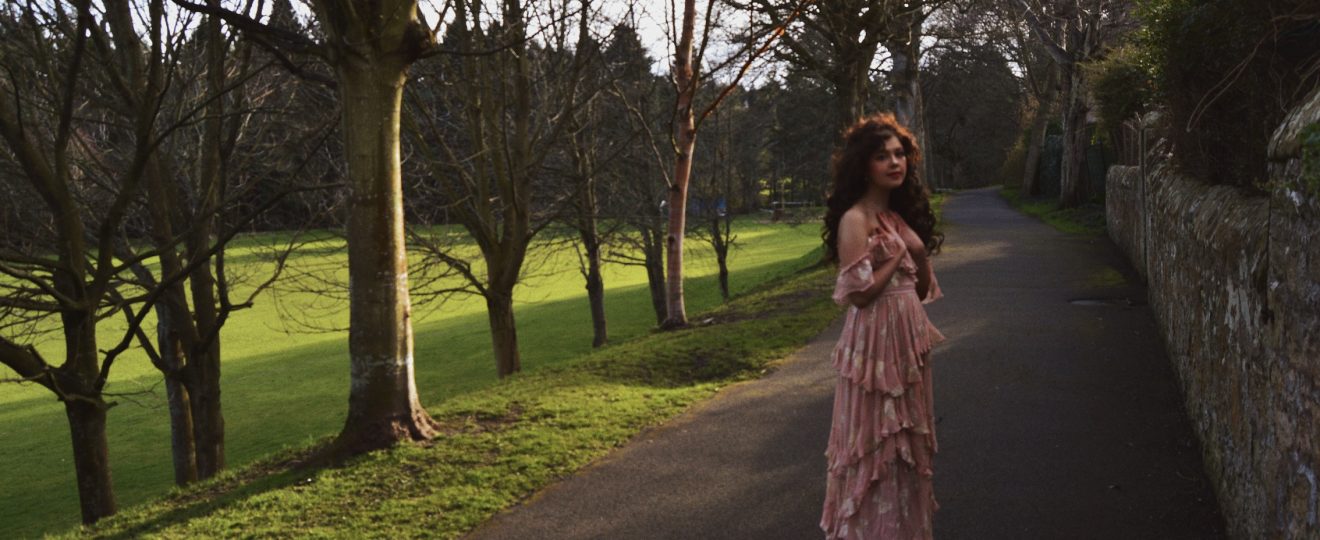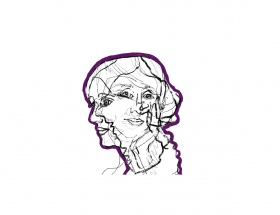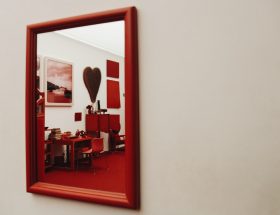
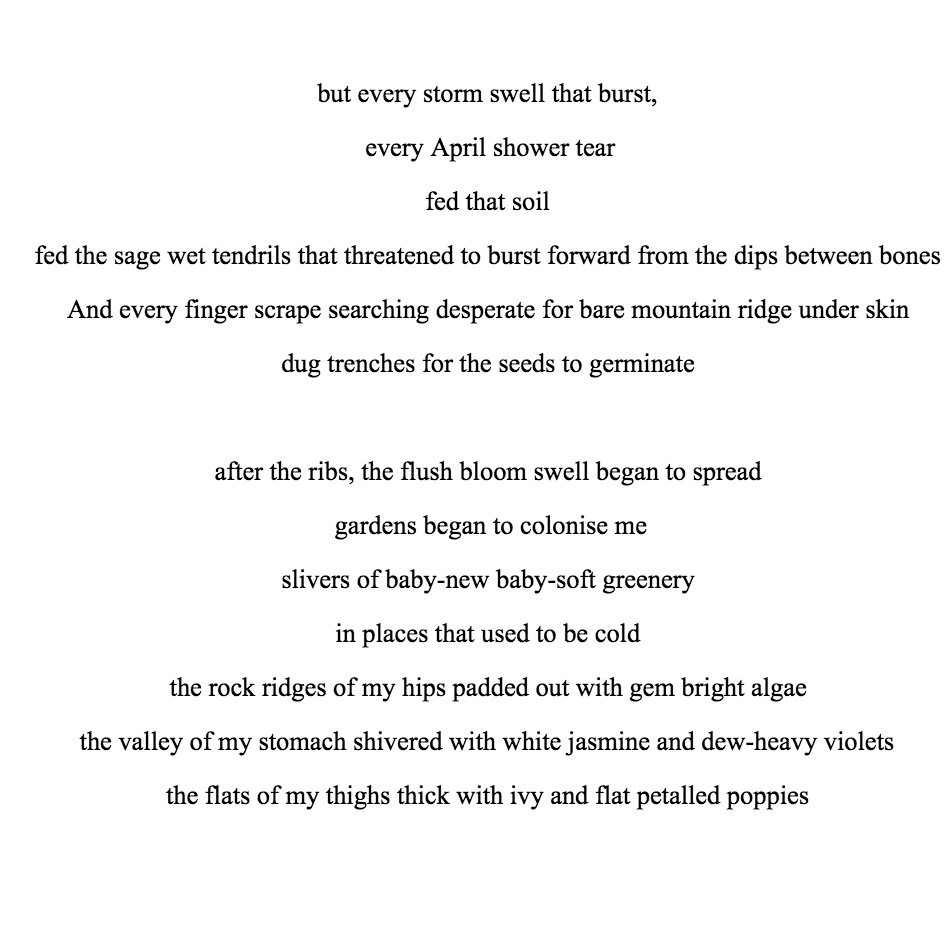
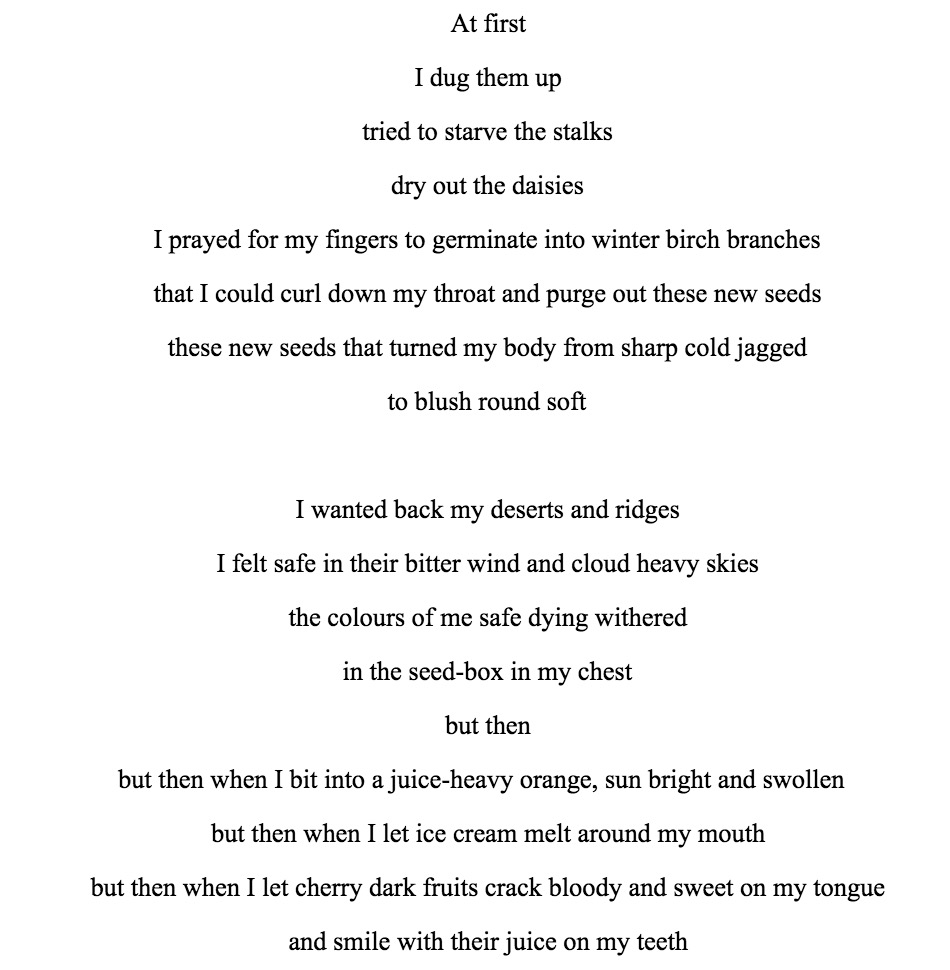
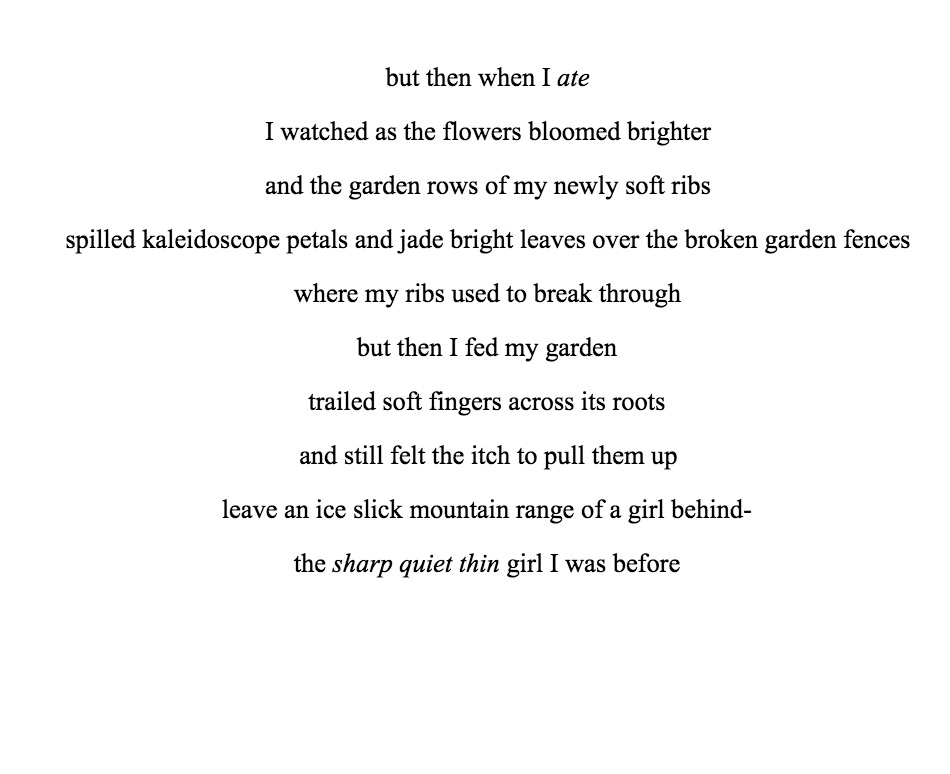
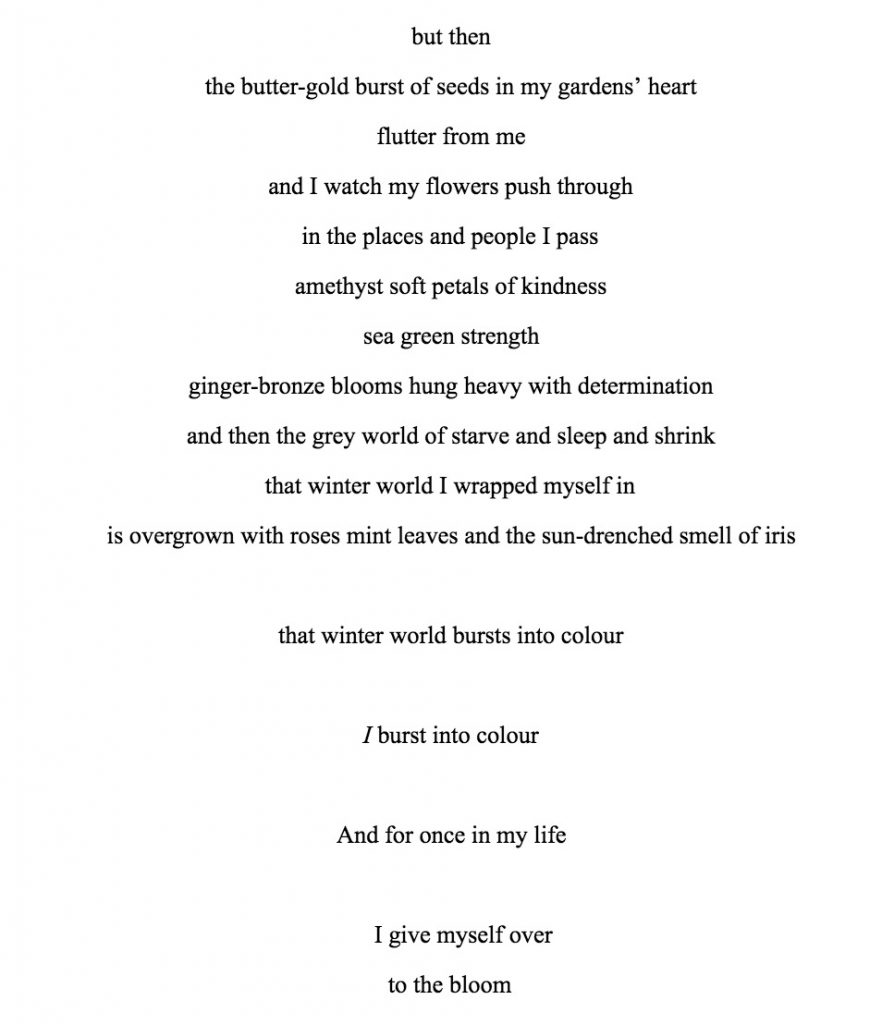
Cait Whiteley is from a small coastal town in South Wales. Having grown up surrounded by the countryside and the beach, in the world of Wordsworth, poetry, and prose, she weaves literary magic even in the most candid of conversation. Cait and I spoke for almost an hour, and in interviewing her, I was captivated by her beautiful mind and her deep insights into the societal and cultural structures of our world and their subsequent connection to standards of beauty and gender dichotomies. Originally, we weren’t going to include the sound bite, however, I felt Caits honesty and intellect couldn’t accurately be captured by words alone. In the recording, you can hear construction site sounds, the ice in my cup clinking, and a ton of white noise. Despite it all, the conversation is dynamic, interesting, and transforms from its original conversational springboard to a new dimension of cultural critique. Below, I list some of her golden quotes. If you wish to listen to the interview, the clip can be found here.
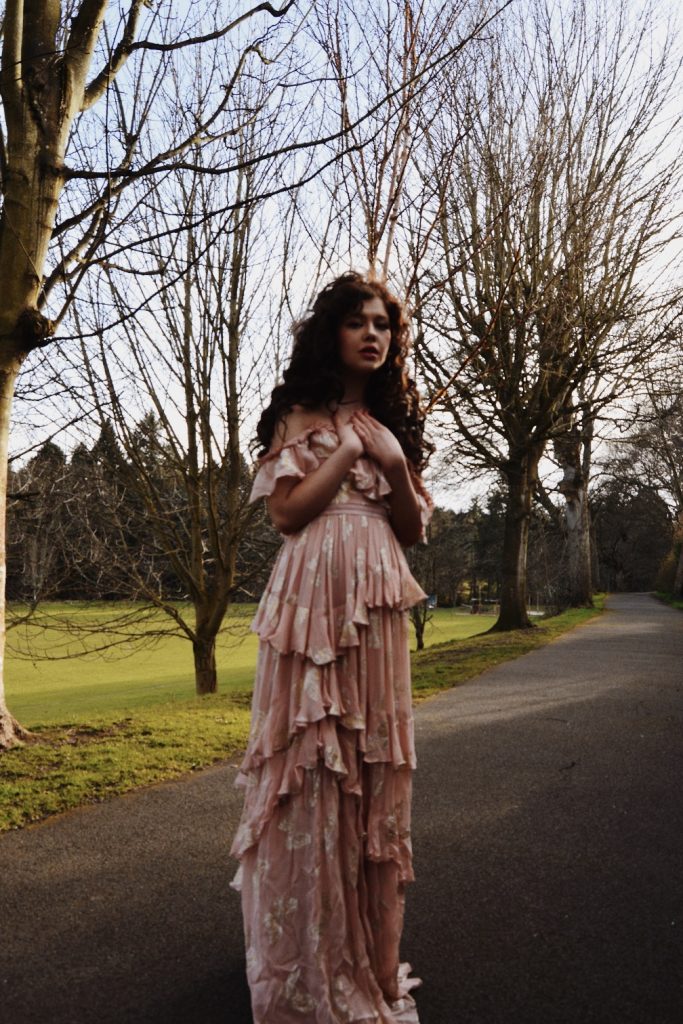
On Her Background:
Every year [in Wales] on the first of March there’s a celebration of music and poetry and art, and a person gets crowned for their poetry: The Bard. They get knighted and sat on this fancy chair and things, and they become the Bard of Wales, so the songstress and poet of Wales. That’s always been my dream since I was little, so I think it’s encouraged me to write a lot more because I’ve always been like “I want to be the Bard!”.
I’m not normally a poetry writer, recently I kind of write more prose, but I saw the theme [of the competition] and thought “oh it’s really nice!” and it’s the first time I have written poetry in ages. I used to write a lot when I was younger (very angsty teen), and I found them the other day and was like “Oh Caitlin, what are you doing?”. But I saw the theme and it was actually really cathartic for me to write to it.
I have an older brother and sister, but they’re a lot older. And our house is and was very much out in the countryside, so I spent a lot of time with my Mum and Dad.
My dad taught me to read at a very young age, and ever since that point, I have just been in love with words. I just think there is such a power to them.
Swords and guns fight wars but words start them. I think that if you can wield the power of words, and in a time as we are in with demagogues and abusers in positions of such high power, if you can have a command over words you have command over the truth and you can help people to grow and develop and see things in that way, and I think that that is infinitesimally important. Because of those sorts of interlocking strands,
On Art, Poetry, and the World:
It hints at it in the poem, but I have had a lot of struggles with image, and self-image, and body things, and to be complimented on the way that I write is like being complimented on who I am inside, and that’s such a rare feeling for me. It makes me feel like more than just a shell and I can’t describe how much that means.
I was very solipsistic as a child, I spent a lot of time on my own. I remember opening books and just being fascinated by the fact that you could be in 18th century England or wonderland, just through looking at words. I thought that if I could do anything, I would want to create those pictures for people. I think that aside from their political importance, words have a means of providing joy, and providing comfort, and allowing people to feel all of their emotions whether it’s sadness or happiness or lust or hatred or envy. You don’t feel alone through words.
And as someone who has spent a lot of time alone, that was so important to me, that I could read the words of other people and know that my emotions weren’t weird or strange.
The subject of the poem is about eating disorder issues and health issues in general, and I feel like those are such isolating, lonely diseases. You don’t feel connected to anyone else, you feel strange. Like, everyone else is just thin, right? Everyone else is just perfect and happy. So if I could say “look, you CAN feel like this, you aren’t alone”, I think that’s really important to me.
I think a lot of the time emotions are devalued in society and you’re just meant to suck it up and get over it and that is not the case.

Writing is one of the only ways I feel I can make a mark and help myself in that way.
I actually felt like a very big hypocrite when I sent that poem in. I was diagnosed three years ago after my grandfather passed away. For the first time I wrote a sort of outline over Christmas, and when I saw the theme I thought “Oh! I can crystallise these ideas!”
It was the first Christmas in three years that I ate and joked with my family and leaving the bathroom I wasn’t frantically checking for evidence of eating. I went to Paris with my boyfriend and we ate 12 macaroons each in one day (which is a personal achievement) and cheesy pasta and I drank wine and it was brilliant and beautiful and I felt the most like myself that I had for a long time. And then I came back to University, and being independent and being in such a high-pressure environment puts a lot of stress on things, and obviously having a Christmas where you can eat what you want has an affect on your body. I went into a bit of a spiral afterwards. I felt like such a hypocrite sending this poem out saying that recovery is easy and I’m there and I’ve done it and you can do it too when I didn’t feel like that. It was very non-linear. I was like “Oh, I’m a liar”.
At that moment I was the happiest I had been in years. I was (and am) very much in love with my boyfriend, I was connecting with my family, I was laughing with my friends, and it made me realise that whatever satisfaction that I was getting at the minute from being smaller was nothing compared to that of blooming, of bursting. That’s a very uncomfortable sensation, of like bursting out of your shell and being bigger because we are taught so much to be smaller.
I’m very vocal on Instagram and stuff like that about being body positive and the difficulties of getting better and I was like “Oh God, if I’m putting this out there and then privately not doing so well, am I a liar? Am I a hypocrite? And then I re-read the poem and it made me see that I was there once. I got there once. And I can get there again. I think that art is in that way, a physical reminder of how you feel at that time.
No one feels
For anyone to feel
Art avoids hypocrisy in that way. Art doesn’t pretend to be permanent. It’s flexible.
Hypocrisy is a fixed statement. It’s unchanging. It’s this is how I am, forever. Whereas art is this is how I am in this moment, and it’s fluid.
I also find that it [art] can be a marker of joy, or a marker of an emotion at a certain time. I feel like, as much as we like to put stock into our memories, they are unreliable. The way I remember things will be completely different from the way you do, or anyone else. It’s very subjective.
I started writing thinking it was about my eating disorder and realised that it was about everything that created my eating disorder.
My parents were always very confused when I was really suffering because food has always been a massive part of our family life. My mum is the best cook, and that’s always been her way of showing love and that’s always been a massive part of our family is sharing food. My dad has always said, “No one is telling you to be smaller. No one has sat you down and said that you’re too big” and I was like, well you haven’t, but newspapers have, magazines have, films have, TV shows, books, and that translates into real things.
There was ‘thunder thighs’ or ‘oh I don’t think that dress is right for you’ or magazines saying ‘if you’re “pear-shaped” dress in tucked in waists’ and continuously, while my parents have never sat me down, everything else has. And I’m done with it.
I know that I’m still very privileged. I am a white woman, I conscribe to euro-centric standards of beauty. My issues are just with my weight, and I know there are so many more horrible, terrible things with the way in which we treat women of colour, the way we treat people of colour, the beauty standards that are imposed upon disabled people… I’m very very lucky that I’m only affected by a very very small part of it, but that small part is part of a bigger whole and we need to change that. There shouldn’t be a beauty standard.
The controlling of emotion and the societal implications that we put on different emotions creates oppression.
There’s a level where men are allowed to show- well, that’s debatable because there are whole issues with male mental health and toxic masculinity- but women have to tread this very fine line. But beyond women, people of colour have to do that too. I feel very hypocritical discussing this because, you know, who am I? I’m a white woman who’s very privileged, I can’t speak for people who suffer in ways I could never imagine.
The bloom doesn’t have to mean a perfect yellow rose. The bloom can be thorns. The bloom can be 10-foot waves. The bloom can be anything you want it to be, it’s just about letting go of that plastic band that’s wrapped around you.
Obviously, men can suffer from eating disorders too, and that’s a massive misconception about eating disorders – that they’re only female illnesses. But I find that where it affects women so much more is that you’re just meant to be silent about it. That’s a woman’s problem. “Don’t be too emotional, don’t talk through it.”
My mum, my friends, when they read it [the poem] they were like “yeah, there’s always been a time” – I’m not saying that in all men’s life that there isn’t, because I’m sure it’s a very personal thing – but for all the women I know there has been a time (whether it’s months or a single moment) where they felt too much, too big, too overgrown. This is my way of trying to tell myself and hopefully tell other people (though I don’t pretend that it has an effect on anyone else) that that doesn’t necessarily have to be a bad thing, and maybe suppressing it is the bad thing.
Every plant goes through seasons of bloom and withdrawal and retreat. No one can exist fully in bloom all the time. Nature can’t do that! It’s as likely to be a single violet as to be a storm, and both of those things are worthy and valid.
The poem tells you about who you are and how you’ve been brought up and how you have lived in the way that you either focus on the giving yourself over, forgetting to be tamed and forgetting to be this perfect English rose garden and becoming an overgrown ivy bursting through the windows. Or you focus on the part of you, the part of the person in the poem, that still seeks to be dead and withered and safe because it’s safer to be quiet and it’s safer to be smaller.
I think that’s the cultural legacy of the way that boys and girls are raised. Speaking specifically about the male/female divide, my father saw it, my boyfriend saw it, my brother saw it, as “why would anyone want to be smaller?”
Whereas every girl I showed it to knew that, and knew that longing for safety, and that longing for “at least if I’m quiet no one will bother me. At least if I’m contained and pretty maybe someone will pick me and put me in a jar.”
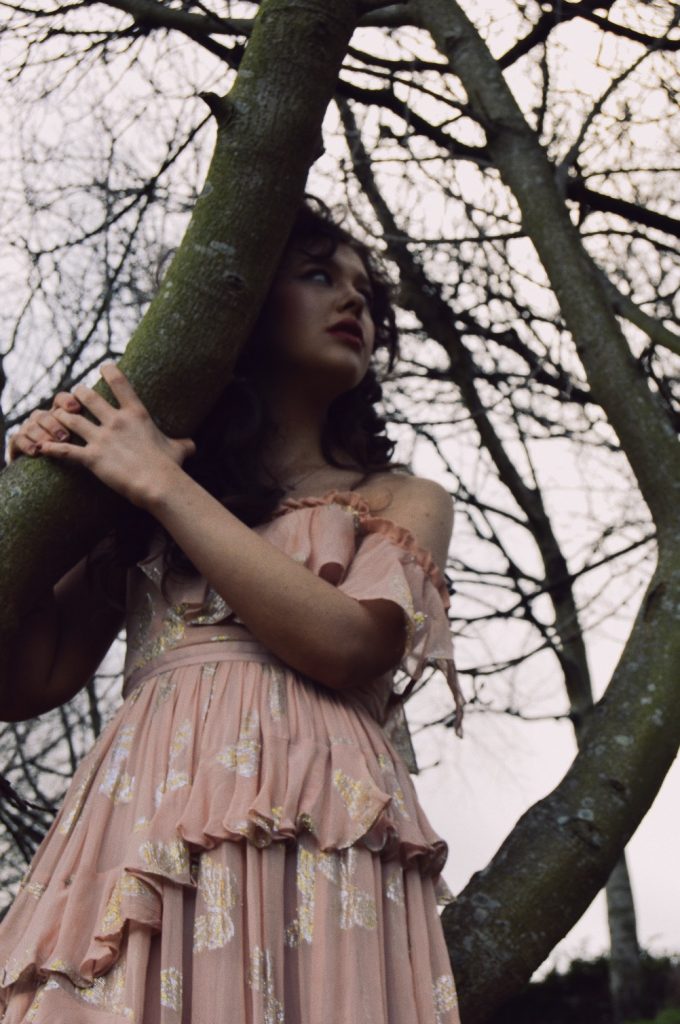
It’s scary, it’s frightening to be out there. But there is a beauty in that. There is a beauty and a value in wanting to be smaller because it shows you where we need to change and how we need to change and it shows the volatility of human emotion in that way but, at the same time, there is more beauty in letting yourself just be.
I think at different times the different parts of that poem speak to me more than others. When I am joyous and wild, the bits that stand out to me are the bits that are like, even if I’m happy, even if I’m eating, there is some part of me that wants to go back to that quiet, scared, place. It reminds me that, I may be great now, but there are still places to work on. You’re always improving. Everyone is always growing.
But when I am the seed husk, when I am trying to cover or hide myself, I read the blooming point and remember that I can get there and that when I am there I am better than I have ever been. And not to swear, but F- anyone who says different, and F- anyone who tells that to you, or any girl, or any woman, or anyone.
Even now, my close friends who are incredible and the strongest women that I know, they will apologise for taking too much at dinner or for crying. You’re allowed to cry!
I think that’s part of the whole cultural nexus. You’re taught to be smaller, dream smaller, talk smaller, and it’s time for that to stop. It’s time for women to just be.
Why should everything else be allowed to grow and flourish and be as they are, and we spend our entire lives pruning ourselves?
And that’s what the poem is about. About being fed up of trying to trim yourself. The whole idea in your head that you have to be smaller.
I remember speaking to my dad about sending it [the poem] in, and he was like “Oh, what is the theme of the competition?” and I explained that it was growth and blooming and things like that, and he was like “then why is your poem so sad?” Whereas my mum read it and she found it joyous and beautiful.
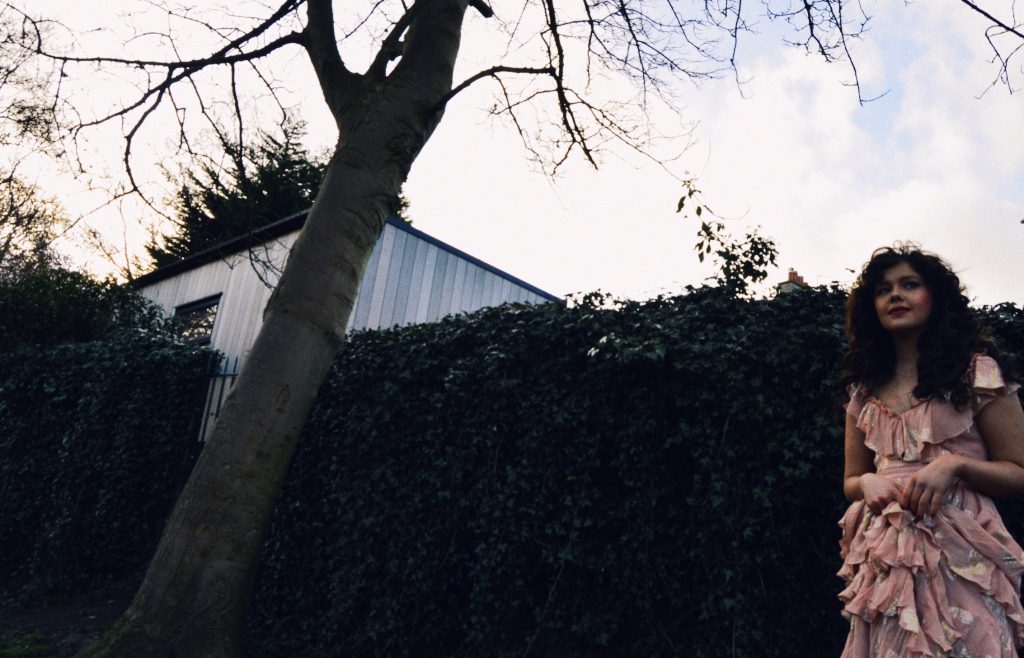
He was like “well growth isn’t a bad thing”. That’s a very, not to be misandrist, a very male thing to say. Men are always taught that growth is obviously better. Physical growth is better (which has its own host of toxic masculinity problems) mental growth is better, that’s progress, that’s developing. Whereas with women, growth is a very feminine issue. There’s the growth of your body which is always (in our culture at least) seen as a very negative thing, but also if you grow in the sense that you want to speak out about things or you want to write out about things or you want to help people or change things and you don’t want to accept it anymore, that growth is negative. You can see the way we treat female politicians. We have female writers who don’t get criticised in the same way as male writers, they get more so. Because if you try and outgrow the position in society that you’ve been taught to have, it isn’t necessarily a positive thing. I think the poem for me, was sort of taking back the idea of growth and making it a positive thing for me. It ceased to be (in my head): don’t overgrow, don’t become a weed, don’t overstay your welcome, don’t overspeak. The poem felt like me telling myself that it’s okay to have a voice and it’s okay to be wild and intense or “too much”.
Being quiet, being small, while it might be acceptable, it’s not incredible. And I think that everybody wants to be incredible in some way.

